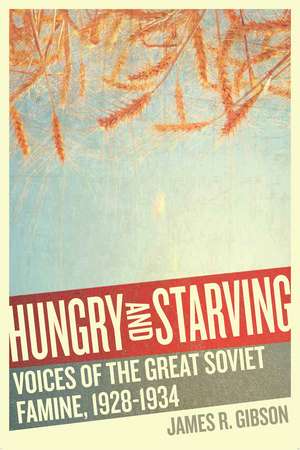Hungry and Starving: Voices of the Great Soviet Famine, 1928–1934
Autor James R. Gibsonen Limba Engleză Hardback – 13 feb 2024
In the wake of Vladimir Lenin’s death in 1924, various protagonists grappled to become his successor, but it was not until 1928 that Joseph Stalin emerged as leader of the Russian Marxists’ Bolshevik wing. Surrounded by an increasingly hostile capitalist world, Stalin reasoned that Soviet Russia had to industrialize in order to survive and prosper. But domestic capital was scarce, so the country’s minerals, timber, and grain were sold abroad for hard currency for funding the development of heavy industry. Claiming total control of agricultural management and production, Stalin implemented the collectivization of farming, consolidating small peasant holdings into large collective farms and controlling their output. The program was economically successful, but it came at a high social cost as the state encountered intense resistance, and between 1928 and 1934 collectivization led to the deaths of at least ten million people from starvation and associated diseases. Hungry and Starving elicits the voices of both the culprits and the victims at the centre of this horrific process. Through primary accounts of collectivization as well as the eyewitness observations of ambassadors, reporters, tourists, fellow travellers, Russian emigrés, tsarist officials, aristocrats, scientists, and technical specialists, James Gibson engages the crucial notions and actors in the academic discourse of the period. He finds that the famine lasted longer than is commonly supposed, that it took place on a national rather than a regional scale, and that while the famine was entirely man-made – the result of the ruthless manner in which collectivization was executed and enforced – it was neither deliberate nor ethnically motivated, given that it was not in the Soviet state’s economic or political interest to engage in genocide. Highlighting the experiences of life and death under Stalin’s ruthless regime, Hungry and Starving offers a broader understanding of the Great Soviet Famine.
Preț: 369.52 lei
Nou
Puncte Express: 554
Preț estimativ în valută:
70.74€ • 72.79$ • 59.63£
70.74€ • 72.79$ • 59.63£
Carte indisponibilă temporar
Doresc să fiu notificat când acest titlu va fi disponibil:
Se trimite...
Preluare comenzi: 021 569.72.76
Specificații
ISBN-13: 9780228019992
ISBN-10: 0228019990
Pagini: 498
Ilustrații: 4 tables
Dimensiuni: 152 x 229 x 41 mm
Greutate: 0.77 kg
Editura: McGill-Queen's University Press
Colecția McGill-Queen's University Press
ISBN-10: 0228019990
Pagini: 498
Ilustrații: 4 tables
Dimensiuni: 152 x 229 x 41 mm
Greutate: 0.77 kg
Editura: McGill-Queen's University Press
Colecția McGill-Queen's University Press
Recenzii
"Gibson focuses on contextualizing the Great Soviet Famine within the history of frequent local and national famines in both Tsarist Russia and the USSR in order to describe the human and economic costs in different oblasts (provinces) and to evaluate the environmental, political, and ideological causes. Sources include speeches, reports, memoirs, and correspondence of government and official authorities. Recommended. Lower-division undergraduates through faculty; professionals." Choice
“Impressively researched, this book sets itself apart from most other studies in the English-language historiography of the famines. It is a story told mainly through the human voices of the famine years. A major contribution to the literature, it is poised to spark new debate.” John-Paul Himka, University of Alberta and author of Ukrainian Nationalists and the Holocaust: OUN and UPA's Participation in the Destruction of Ukrainian Jewry, 1941–1944
Notă biografică
James R. Gibson is professor emeritus and senior scholar at York University.
Descriere
Stalin’s collectivization of Soviet Russia’s agriculture resulted in the deaths of at least ten million people through starvation and associated diseases between 1928 and 1934. Hungry and Starving explores primary accounts of the Great Soviet Famine on the part of both its perpetrators and its sufferers.
